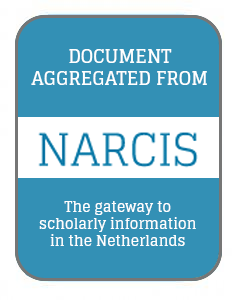Focal point
Location
National Academic Research and Collaborations Information System (NARCIS) is the main Dutch national portal for those looking for information about researchers and their work. NARCIS aggregates data from around 30 institutional repositories. Besides researchers, NARCIS is also used by students, journalists and people working in educational and government institutions as well as the business sector.
NARCIS provides access to scientific information, including (open access) publications from the repositories of all the Dutch universities, KNAW, NWO and a number of research institutes, datasets from some data archives as well as descriptions of research projects, researchers and research institutes.
This means that NARCIS cannot be used as an entry point to access complete overviews of publications of researchers (yet). However, there are more institutions that make all their scientific publications accessible via NARCIS. By doing so, it will become possible to create much more complete publication lists of researchers.
In 2004, the development of NARCIS started as a cooperation project of KNAW Research Information, NWO, VSNU and METIS, as part of the development of services within the DARE programme of SURFfoundation. This project resulted in the NARCIS portal, in which the DAREnet service was incorporated in January 2007. NARCIS has been part of DANS since 2011.
DANS - Data Archiving and Networked Services - is the Netherlands Institute for permanent access to digital research resources. DANS encourages researchers to make their digital research data and related outputs Findable, Accessible, Interoperable and Reusable.
Members:
Resources
Displaying 301 - 305 of 1863Contesting control : land and forest in the struggle for Loita Maasai self-government in Kenya
Abstract
Contesting Control: Land and Forest in the Struggle for Loita Maasai Self-government in Kenya
Angela Kronenburg García
Naar een groene planologie: planologie in Wageningen
In Wageningen heeft de planologie van meet af aan haar plaats tussen de technische wetenschappen moeten vinden en hervinden. Naast aansprekende resultaten, zoals de lagenbenadering die in Wageningen is ontwikkeld, heeft dat geleid tot permanent theoretiseren van de complexe wederzijdse inwerking tussen menselijk handelen en bodem, water en klimaat. Groene planologie en het landschap als centraal onderzoeksobject bepalen de huidige positie en theorievorming van de planologie.
Inventarisatie potentiële locaties Tijdelijke Natuur in Nederland
InnovatieNetwerk heeft in samenwerking met partijen uit de samenleving het concept ‘Tijdelijke Natuur’ ontwikkeld. Dit heeft ertoe geleid dat tot op heden dertig grondeigenaren op 2.000 ha tijdelijke natuur hebben laten ontstaan. Het concept houdt in dat op gronden die wachten op realisatie van bestemmingen zoals bedrijvigheid of wonen, natuur voor een beperkt aantal jaren een kans krijgt zich te ontwikkelen. Dit levert winst op voor mens én natuur.
Quantifying the effects of management on ecosystem services
Dit proefschrift onderzoekt de effecten van landbeheer op ecosysteemdiensten. Landbeheer betreft de menselijke activiteiten die landgebruik ondersteunen. Het geheel werd toegepast in drie case studies, variërend van landschap- tot bioomniveau: in Nationaal Landschap 'Het Groene Woud' in Noord Brabant (Hoofdstuk 3), mangrovesystemen in Java, Indonesië (Hoofdstuk 4), en voor ‘rangelands’ op globale schaal (Hoofdstuk 5).
Self-build in the UK and Netherlands: mainstreaming self-development to address housing shortages?
This paper examines approaches to self or custom-build in the Netherlands and the UK to offer comparative insights into self- and custom-built housing contexts and cultures, and specifically, the relationships with local and strategic planning arrangements. The paper reviews arguments for self-build as a means to address housing shortages and examines the evidence of completions in practice. It positions the discussion in light of arguments that self-build can become a mainstream source of housing provision.


